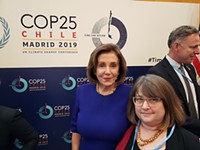Point Austin: Can't Say We Weren't Warned
New U.N. "emissions gap" report heightens climate change alarm.
By Michael King, Fri., Dec. 6, 2019
In 1965, the U.S. President’s Science Advisory Committee issued to the Johnson administration a document called “Restoring the Quality of Our Environment: Report of the Environmental Pollution Panel.” Although most of the report addressed immediately pressing problems – direct air and water pollution – an appendix described a more long-term issue: “Atmospheric Carbon Dioxide.” The researchers noted that while precise measurements were still difficult, it was clear that man-made CO2 was a growing problem, primarily generated by the burning of fossil fuels.
The report specifically warned of the potential consequences, including melting of the Antarctic ice cap, rising sea levels, and warming and increasing acidity of waters. “Man is unwittingly conducting a vast geophysical experiment,” the scientists concluded. “Within a few generations he is burning the fossil fuels that slowly accumulated in the earth over the past 500 million years. … The climatic changes that may be produced by the increased CO2 content could be deleterious from the point of view of human beings. The possibilities of deliberately bringing about countervailing climatic changes therefore need to be thoroughly explored.”
President Johnson briefly acknowledged the warning, successive presidents received similar reports over the subsequent years, and in 2015 there was a flurry of discussion over the then-50-year-old report (including that its prediction of a 25% increase by 2000 was too conservative). One of these days, maybe the warnings will stick – but this week’s news is that global warming emissions have continued to grow – expected to reach an all-time high for 2019.
Commitments vs. Reality
The latest alarm sounds in the 2019 “Emissions Gap Report” just released by the United Nations Environment Programme. The Gap Report summarizes the distance between “where we are likely to be and where we need to be” on reducing global emissions, and concludes bluntly, “incremental changes will not be enough and there is a need for rapid and transformational action.” The report’s findings include that after a brief pause (2014-16), emissions are again rising; every year of delay requires stronger action (“deeper and faster cuts”) for a “least-cost” limiting of increases in global temperatures; the wealthiest nations (i.e., the G20) account for 78% of global greenhouse gas emissions; just seven (Argentina, Brazil, China, the EU, India, Japan, the U.S.) are responsible for over 56%.
All of these countries have made self-defined “commitments” (“nationally determined contributions”) to reduce emissions, with the common long-term goal of net-zero emissions by 2050. None are on target to keep those commitments, and the largest emitters (China and the U.S., although the U.S. is higher per capita) are moving in the wrong direction. Notable for us is that the Trump administration – in keeping with its arrogant rejection of most environmental science – has dismissed the climate crisis as a “hoax” and withdrawn from common international efforts to address it.
Urgent Action Needed
I asked Zach Baumer, the city’s climate program manager, for his thoughts on the Emissions Gap Report and what it means for Austin. In the absence of either state or federal support, cities will need to assume even greater responsibilities (Mayor Steve Adler just joined the steering committee of the 400-member Climate Mayors Coalition). Baumer said the Gap Report essentially reiterates and highlights last year’s “1.5 degree report” by the Intergovernmental Panel on Climate Change and emphasizes the difference between “commitments” and actual reductions. “The reality of needing to reduce fossil fuels is very real,” he said, “and if we don’t take concerted action, those emissions are not going to come down.”
Baumer said he’s sharing the report “and its urgency” with the advisory committees preparing the city’s 2020 Climate Protection Plan. “It’s going to be up to those groups to decide what they want to propose, and then up to the City Council to approve aggressive targets, and to commit more resources to implementing projects that create real reductions.” Beyond greater use of renewable energy sources, he mentioned land use, Project Connect, “anything we can do to get people out of cars,” and incentivizing electric vehicles …
Can we avoid generational despair? “That’s the question that keeps me up at night,” Baumer said. “We should absolutely keep trying. … We know that the climate is changing, and it’s a question of how much it’s going to change. We need to make sure that the city is prepared … to protect people and health and life going forward.”
Visit austinchronicle.com to keep up with Texas Impact’s video reporting from the COP25 climate conference in Madrid.
Got something to say on the subject? Send a letter to the editor.











